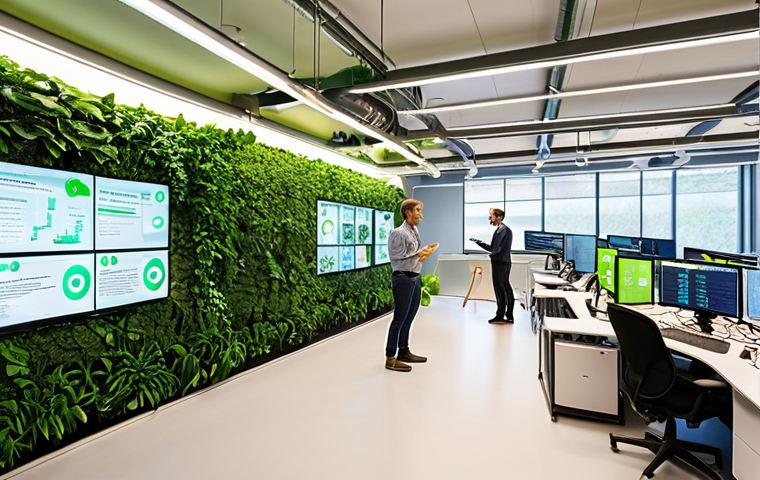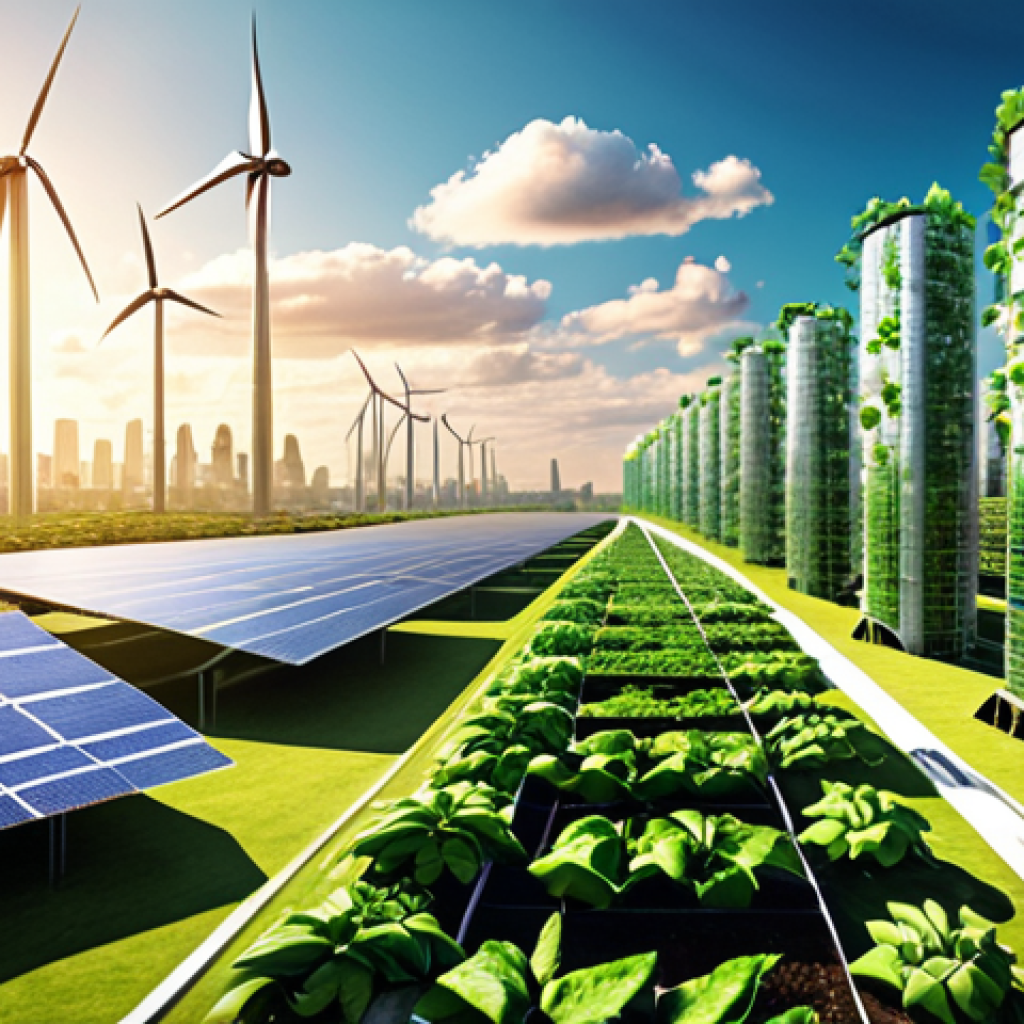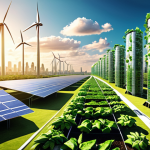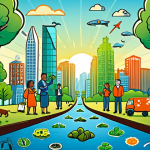Honestly, it feels like just yesterday ‘sustainability’ was this rather niche buzzword, something only a few forward-thinking companies genuinely championed.
But what I’ve seen firsthand, navigating discussions in various industries and even through personal choices, is an undeniable, powerful shift. It’s no longer a ‘nice-to-have’; it’s a fundamental imperative, driven by evolving consumer expectations, stringent regulations, and the stark reality of climate change.
The sheer volume of conversations I’m hearing around climate tech, circular economy models, and comprehensive ESG (Environmental, Social, Governance) frameworks isn’t just corporate jargon anymore; it’s a profound restructuring of how businesses operate.
From where I stand, this isn’t some fleeting trend; it’s the definitive, inevitable direction for our economies and societies. This monumental pivot is, crucially, creating an absolute goldmine of professional opportunities, unlike anything we’ve witnessed before.
We’re talking about vital roles that barely existed a decade ago – from renewable energy strategists and sustainable supply chain architects to green finance analysts – and the demand for these experts is quite literally skyrocketing.
It’s truly exhilarating to be part of this transformation and to consider the tangible impact we can all have.
It’s truly exhilarating to be part of this transformation and to consider the tangible impact we can all have. Let’s explore this further.
The Green Revolution: Redefining Professional Paradigms

The monumental shift toward sustainability isn’t just a philosophical ideal anymore; it’s a profound restructuring of entire industries, leading to the emergence of roles that simply didn’t exist a decade ago. From my vantage point, having observed this evolution unfold in real-time, it’s clear that businesses are no longer merely adapting to external pressures; they are proactively embedding environmental, social, and governance (ESG) principles into their core strategies. This isn’t some niche department activity; it’s a C-suite priority, influencing everything from product design and supply chain logistics to marketing and investor relations. I’ve personally witnessed companies, large and small, retooling their entire operations, often at significant upfront cost, because they understand that long-term viability absolutely depends on it. It’s been fascinating to see how even traditionally ‘dirty’ industries are innovating, driven by a blend of consumer demand, regulatory foresight, and a genuine desire to be part of the solution. This redefinition isn’t just about ‘green’ products; it’s about ‘green’ processes, ‘green’ financing, and ultimately, a ‘green’ mindset pervading every layer of an organization. It genuinely feels like we’re on the cusp of a complete economic reset, where sustainability isn’t just a buzzword, but the foundational principle for success and resilience in the 21st century.
1. From Niche to Core: Sustainability Across Industries
What I’ve come to realize is that no sector is immune to this transformation, nor should it be. Take finance, for instance: ‘green bonds’ and ‘impact investing’ used to be considered fringe, but now they’re mainstream, attracting trillions of dollars globally. Similarly, in manufacturing, the focus has pivoted dramatically from mere efficiency to circularity, where products are designed for disassembly, reuse, and recycling, minimizing waste from the very start. I’ve seen some incredible examples of this firsthand, where designers are working alongside materials scientists to innovate beyond traditional linear models. Even in areas you might not immediately associate with sustainability, like technology, there’s a huge push for energy-efficient data centers and ethical sourcing of rare earth minerals. It’s a comprehensive evolution, and honestly, it’s thrilling to watch how different industries are creatively responding to the urgent call for a more sustainable future, often unearthing ingenious solutions that benefit both the planet and the bottom line. This cross-sector integration is what makes this moment so unique and full of potential.
2. Regulatory Catalysts and Consumer Demand
For me, it’s undeniable that stringent regulations, combined with an increasingly conscious consumer base, are acting as powerful twin engines driving this sustainability wave. Governments worldwide are rolling out ambitious climate targets and robust environmental policies, compelling businesses to clean up their acts or risk significant penalties and reputational damage. We’re seeing mandates for carbon reporting, restrictions on single-use plastics, and incentives for renewable energy adoption. But it’s not just about compliance; the consumer shift is equally, if not more, impactful. People, especially younger generations, are genuinely scrutinizing where they spend their money, demanding transparency and ethical practices from the brands they support. I’ve had countless conversations where individuals express their frustration with ‘greenwashing’ and their desire to genuinely support companies that walk the talk. This dual pressure — from the top down and the bottom up — is creating an incredibly fertile ground for the growth of sustainable jobs, as companies scramble to meet these new, demanding expectations and communicate their efforts authentically. It’s a fascinating dynamic that I believe will only intensify, pushing the boundaries of what’s considered standard business practice.
Cultivating Green Talent: Essential Skills for the Future
Having observed countless professionals transition into and thrive within the green economy, I’ve started to identify a distinct set of skills that truly make a difference. It’s not just about having a science degree or an environmental studies background anymore; while those are incredibly valuable, the most successful individuals I’ve encountered possess a unique blend of technical acumen, interdisciplinary thinking, and an unwavering commitment to impact. This isn’t merely theoretical; it’s about being able to bridge gaps between traditionally separate departments – think engineering, finance, and marketing – to deliver truly holistic sustainable solutions. I’ve seen how crucial it is to be a systems thinker, understanding how complex ecological and social systems interact with economic ones. It’s genuinely inspiring to see how people adapt and acquire these new competencies, often demonstrating a remarkable agility in their career development. This isn’t a fleeting trend; it’s a fundamental recalibration of what constitutes valuable expertise in a rapidly changing world, and it requires a proactive approach to continuous learning and skill development that goes beyond traditional education pathways.
1. Interdisciplinary Problem-Solving and Systems Thinking
In my experience, the ability to connect seemingly disparate fields is paramount in sustainability. You might be a financial analyst, but if you don’t understand the ecological impact of an investment or the social implications of a supply chain, you’re missing a huge piece of the puzzle. It’s about looking at challenges not in isolation, but as interconnected parts of a larger system. I often tell people that the biggest problems we face – climate change, resource scarcity – are inherently complex, meaning simple, siloed solutions just won’t cut it. You need to be able to pull insights from biology, economics, policy, and even psychology to devise truly effective strategies. This means embracing a mindset that seeks out connections, understands feedback loops, and anticipates unintended consequences. It’s a challenging but incredibly rewarding way of thinking, and I’ve seen it empower individuals to propose innovative solutions that genuinely move the needle for their organizations.
2. Data Literacy and Impact Measurement
If there’s one thing I’ve learned, it’s that in the world of sustainability, what gets measured gets managed. You can have the best intentions, but without robust data to back up your claims and demonstrate real impact, it’s just talk. Professionals in this field absolutely need to be comfortable with data analytics, understanding how to collect, interpret, and communicate environmental and social metrics. This isn’t just for dedicated ‘sustainability analysts’; even a marketing professional needs to understand how to quantify the emissions saved by a new product or the social benefits of a community project. I’ve seen companies struggle to justify their sustainable initiatives to stakeholders because they couldn’t provide concrete, measurable results. Developing strong data literacy, including familiarity with tools for lifecycle assessments or ESG reporting, is no longer optional; it’s a core competency that differentiates those who genuinely drive change from those who merely observe it. It’s about moving beyond anecdotal evidence to verifiable, tangible progress.
A Deep Dive into Emerging Green Career Paths
It’s truly astounding to witness the sheer diversity of roles that are popping up within the green economy. When I started my journey, the options felt somewhat limited, perhaps centered around environmental policy or basic conservation. Now, however, the landscape is incredibly rich and varied, offering pathways for almost any professional background imaginable. From what I’ve personally observed, these aren’t just minor adaptations of existing jobs; they are entirely new specializations, requiring unique blends of knowledge and passion. It’s clear that this isn’t a temporary boom; these are foundational roles that will define the economy for decades to come. I often get asked by aspiring professionals about what specific jobs they should target, and honestly, the answer is becoming more nuanced every day. It’s less about picking a single job title and more about identifying where your unique skills and interests intersect with the urgent needs of a sustainable future. This exploration often leads to unexpected and incredibly fulfilling career trajectories, as people find themselves solving some of the world’s most pressing challenges in incredibly creative ways.
1. Key Pillars of Sustainable Employment Growth
When I break down the major areas where I’m seeing significant growth, a few key pillars consistently emerge. Renewable energy, of course, is a massive one, encompassing everything from solar engineers and wind turbine technicians to project developers and grid integration specialists. But beyond that, the circular economy is generating a whole new class of jobs: materials scientists focused on biodegradable alternatives, product designers specializing in ‘design for disassembly,’ and reverse logistics managers handling end-of-life product streams. Then there’s green finance, where analysts evaluate ESG risks and opportunities, and impact investors deploy capital into sustainable ventures. And let’s not forget sustainable agriculture, where agronomists and food technologists are revolutionizing food systems. These aren’t just jobs; they are entire ecosystems of innovation and opportunity that are reshaping industries from the ground up, making for incredibly dynamic and purpose-driven career choices that genuinely feel impactful.
2. Table of Emerging Green Roles
To give you a clearer picture, here’s a quick overview of some of the fascinating roles I’m seeing gain significant traction. This table barely scratches the surface, but it highlights the diversity and depth of opportunities out there right now.
| Role Category | Emerging Job Titles | Core Responsibilities & Impact |
|---|---|---|
| Renewable Energy | Solar Project Manager, Wind Turbine Technician, Grid Modernization Engineer | Oversees development/maintenance of clean energy projects, integrates renewables into power grids. |
| Circular Economy | Circular Design Specialist, Waste-to-Value Engineer, Reverse Logistics Manager | Designs products for longevity and recycling, innovates waste management, manages material recovery. |
| Sustainable Finance | ESG Analyst, Impact Investment Associate, Green Bond Strategist | Evaluates environmental/social/governance performance, directs capital towards sustainable ventures. |
| Sustainable Supply Chain | Sustainable Sourcing Manager, Ethical Supply Chain Auditor, Carbon Footprint Analyst | Ensures ethical and low-impact sourcing, verifies supply chain sustainability, calculates emissions. |
| Climate Adaptation & Resilience | Coastal Resilience Planner, Climate Risk Analyst, Urban Ecologist | Develops strategies for climate change adaptation, assesses climate-related financial risks, designs green infrastructure. |
The Entrepreneurial Spirit: Innovating for a Greener Tomorrow
What genuinely excites me about the green transition is the explosion of entrepreneurial activity it’s fostering. It’s not just big corporations adapting; it’s countless startups, driven by passionate founders, who are identifying unmet needs and creating entirely new markets. I’ve had the privilege of meeting some incredibly innovative individuals who are building businesses around everything from sustainable packaging and vertical farming to carbon capture technologies and AI-driven energy efficiency solutions. It feels like a return to pure, unadulterated innovation, where creative problem-solving is directly tied to addressing environmental challenges. This isn’t just about making money; it’s about making a tangible difference, which I find incredibly motivating. The energy in this space is palpable, and the rapid pace at which these startups are developing and scaling their solutions is frankly astonishing. They’re often more agile than established players, able to pivot quickly and embrace cutting-edge technologies, making them critical drivers of the sustainable economy.
1. Startup Ecosystems and Green Innovation Hubs
I’ve personally visited several ‘green tech’ incubators and accelerators, and the buzz is just infectious. These hubs, often supported by government grants or private venture capital, provide the perfect environment for sustainable startups to flourish. They offer mentorship, funding, and networking opportunities that are absolutely crucial for early-stage companies. What I consistently observe is a collaborative spirit; founders aren’t just competing, they’re often supporting each other, sharing insights, and even partnering on projects. This ecosystem approach is vital because many green solutions require interdisciplinary expertise and significant upfront investment. Seeing these communities come together, whether in Silicon Valley, London, or Berlin, dedicated to solving complex environmental problems through business, gives me immense hope. It underscores the idea that innovation doesn’t have to be a solitary pursuit; it can be a collective effort, amplifying impact exponentially.
2. Impact Investing and Venture Capital for Green Ventures
It’s no secret that capital fuels innovation, and what’s particularly heartening for me is the growing appetite among investors for genuinely sustainable ventures. ‘Impact investing,’ which seeks both financial returns and positive social/environmental outcomes, has moved from a niche concept to a significant force in the financial world. I’ve seen major venture capital firms, once solely focused on purely tech-driven returns, now actively seeking out climate tech, cleantech, and sustainable food startups. They understand that these aren’t just ‘good’ investments; they’re smart investments, poised for significant growth as the global economy transitions. This shift in investor mindset is game-changing because it provides the necessary fuel for these promising startups to scale their solutions and achieve widespread adoption. It signifies a profound alignment between financial interests and planetary well-being, a synergy that was less apparent just a few years ago, and it’s something I find incredibly encouraging for the future of our economy.
Beyond the Office: Personal Journeys and Advocacy
For me, working in the sustainability space has never just been about a job title; it’s deeply personal. Many of the professionals I’ve connected with share a profound sense of purpose, driven by a genuine desire to contribute to a better world. It’s not just a career path; it’s often a reflection of deeply held values and a commitment to creating a more equitable and resilient future. I’ve seen how this passion translates into incredible dedication, with individuals going above and beyond their formal roles to advocate for change, educate others, and inspire action. It’s truly inspiring to be part of a community where people are not only excelling professionally but are also actively engaged in broader societal movements. This isn’t a field for those seeking a purely transactional work life; it’s for individuals who want their daily efforts to align with their personal convictions, creating a powerful synergy between work and purpose that I believe is increasingly vital for professional fulfillment in today’s world.
1. The Fulfillment of Purpose-Driven Careers
I can honestly say that very few things compare to the satisfaction of knowing your work contributes to solving pressing global challenges. In sustainability, that feeling is a daily reality for many of us. Whether you’re designing a more energy-efficient product, advising on ethical investments, or implementing a carbon reduction strategy, there’s a clear line connecting your effort to a positive impact on the planet and society. I’ve often reflected on how this sense of purpose transcends typical job satisfaction; it’s a deeper, more profound sense of fulfillment that comes from aligning your professional life with your core values. This isn’t to say it’s always easy; the challenges are immense, and progress can sometimes feel slow. But the underlying motivation, that unwavering belief in the importance of what we’re doing, is a powerful force that sustains and energizes the green workforce. It truly makes the hard days worth it, and I’ve heard countless colleagues express similar sentiments.
2. Becoming a Sustainability Advocate in Your Role
What I’ve come to understand is that you don’t necessarily need ‘sustainability’ in your job title to be a powerful advocate. Every single role, in every single industry, has the potential for a green dimension. I’ve seen accountants push for better ESG reporting, marketing professionals champion sustainable product messaging, and HR departments integrate sustainability into corporate culture. It’s about looking for opportunities, however small, to infuse green principles into your daily tasks and strategic decisions. It might start with simply asking ‘how can we do this more sustainably?’ or ‘what’s the environmental footprint of this process?’ This internal advocacy is incredibly powerful because it drives change from within, often leading to systemic improvements that external pressure alone might not achieve. Being an advocate within your sphere of influence, regardless of your official title, is a crucial part of this transition, and it’s something I passionately believe everyone can contribute to, making a collective difference one small, intentional step at a time.
Closing Thoughts
The journey into the green economy truly feels like stepping into the future, and I genuinely believe there’s a place for everyone within it. What started as a niche has undeniably blossomed into a global movement, reshaping industries and redefining what constitutes meaningful work. As I reflect on the sheer breadth of opportunities and the palpable passion of those already involved, I’m convinced that embracing this shift isn’t just smart for our careers; it’s essential for our collective future. This is more than a trend; it’s a foundational transformation, offering unparalleled chances to innovate, contribute, and truly make a difference in the world. I encourage you to explore where your unique talents can intersect with this urgent, exhilarating call to action.
Useful Information
1. Explore Specialized Job Boards: Websites like GreenBiz, Acre, and B Corp Job Board often list roles specifically within sustainability, renewable energy, and ethical businesses. These are fantastic starting points for targeted searches.
2. Pursue Green Certifications & Courses: Consider online platforms like Coursera or edX for sustainability-focused courses, or look into certifications from reputable organizations like LEED, Cradle to Cradle, or Project Management Institute (PMI) for green project management. I’ve found these can really open doors.
3. Network Actively: Join professional associations like the American Sustainable Business Council (ASBC), GreenBiz Executive Network, or local sustainability groups. LinkedIn groups focused on “climate tech” or “circular economy” are also great for connecting with peers and mentors.
4. Follow Industry Publications: Stay updated by reading leading publications such as GreenBiz, Sustainable Brands, Environmental Leader, and BloombergNEF. They provide invaluable insights into trends, new technologies, and policy changes – I personally subscribe to several to keep my finger on the pulse.
5. Volunteer or Intern: Gaining practical experience, even through volunteering for an environmental non-profit or taking an unpaid internship at a sustainable company, can be incredibly beneficial. It provides real-world exposure and often leads to invaluable connections.
Key Takeaways
The “Green Revolution” is a comprehensive economic and professional paradigm shift, moving sustainability from a niche concept to a core business strategy across all industries.
Future-proof skills for green careers are interdisciplinary, emphasizing systems thinking, data literacy, and the ability to measure environmental and social impact.
There’s a vast and growing array of emerging green roles in sectors like renewable energy, circular economy, sustainable finance, and climate adaptation, fueled by both regulatory pressure and consumer demand.
Entrepreneurship and impact investing are driving significant innovation, creating agile startups and new markets focused on sustainable solutions.
Working in the green economy offers profound purpose and fulfillment, encouraging professionals to become advocates for sustainability within their respective roles, regardless of their official title.
Frequently Asked Questions (FAQ) 📖
Q: Why is this push towards sustainability feeling so much more urgent and widespread now compared to, say, a decade ago?
A: Oh, it’s night and day, truly. A decade ago, it felt like a passionate niche, often driven by a few pioneering spirits or perhaps seen as a philanthropic sideline.
But from where I’m standing now, having seen the tides turn across boardrooms and Main Street alike, it’s fundamentally different. We’re past the point of it being a ‘nice-to-have’ PR stunt.
It’s become a non-negotiable for consumers – they’re actively voting with their wallets for ethical brands, demanding transparency. Then you layer on the undeniably stark scientific realities of climate change and the sheer volume of new regulations cropping up globally.
It’s not just about ‘saving the planet’ anymore; it’s about genuine business resilience and competitive advantage. Companies that don’t embed sustainability into their core strategy are quite frankly, getting left behind.
I’ve personally seen the shift in C-suite discussions from ‘can we afford this?’ to ‘how can we not afford to do this?’ – that’s the real, visceral change.
Q: You mentioned a “goldmine of professional opportunities.” What specific types of roles or industries are really booming right now because of this sustainability imperative?
A: It’s absolutely wild how many new doors have opened, and frankly, continue to open every single day. When I say ‘goldmine,’ I mean it. We’re witnessing the birth of entire new job categories that barely registered on the radar even five, ten years ago.
Think about it: renewable energy used to be a fringe topic, now we need sophisticated strategists and project managers for massive solar farms and offshore wind installations.
Supply chains are being completely re-engineered for circularity, demanding experts who can design out waste and integrate closed-loop systems – that’s a huge space.
Then there’s the finance side; “green finance” isn’t just jargon, it’s a booming sector needing analysts who understand carbon markets, ESG investing, and sustainable bonds.
Even in tech, it’s not just about bits and bytes; it’s climate tech, developing solutions for carbon capture, smart grids, and sustainable agriculture.
From my personal experience, just talking to headhunters, the demand for people who truly grasp these concepts and can implement them is through the roof.
It’s no longer just environmental scientists; it’s engineers, economists, lawyers, marketing pros – everyone has a role in this transformation.
Q: For someone looking to get involved, whether personally or professionally, what’s your advice on navigating this evolving landscape and making a tangible impact?
A: That’s the million-dollar question, isn’t it? And honestly, the beauty of it is that impact can come in so many forms. On a personal level, start small: understand your own consumption habits, push for sustainable options where you shop, or even just engage in local community initiatives.
It builds awareness. Professionally, my best advice is to first identify where your existing skills intersect with the sustainability agenda. Are you a data analyst?
There’s a massive need for ESG data reporting. A marketing person? Sustainable storytelling is crucial.
Don’t feel you need to go back to school for a brand new degree unless that’s truly your passion; often, it’s about re-skilling or finding a mentor who’s already deep in the space.
Network like crazy. Attend industry webinars, join professional groups, read everything you can get your hands on. I’ve seen countless individuals successfully pivot by just demonstrating genuine curiosity and a willingness to learn and apply their unique perspective.
The key is to be proactive and remember that every small step, every informed decision, contributes to this larger, necessary shift. It’s incredibly rewarding to feel like you’re part of something so vital.
📚 References
Wikipedia Encyclopedia
구글 검색 결과
구글 검색 결과
구글 검색 결과
구글 검색 결과
구글 검색 결과



